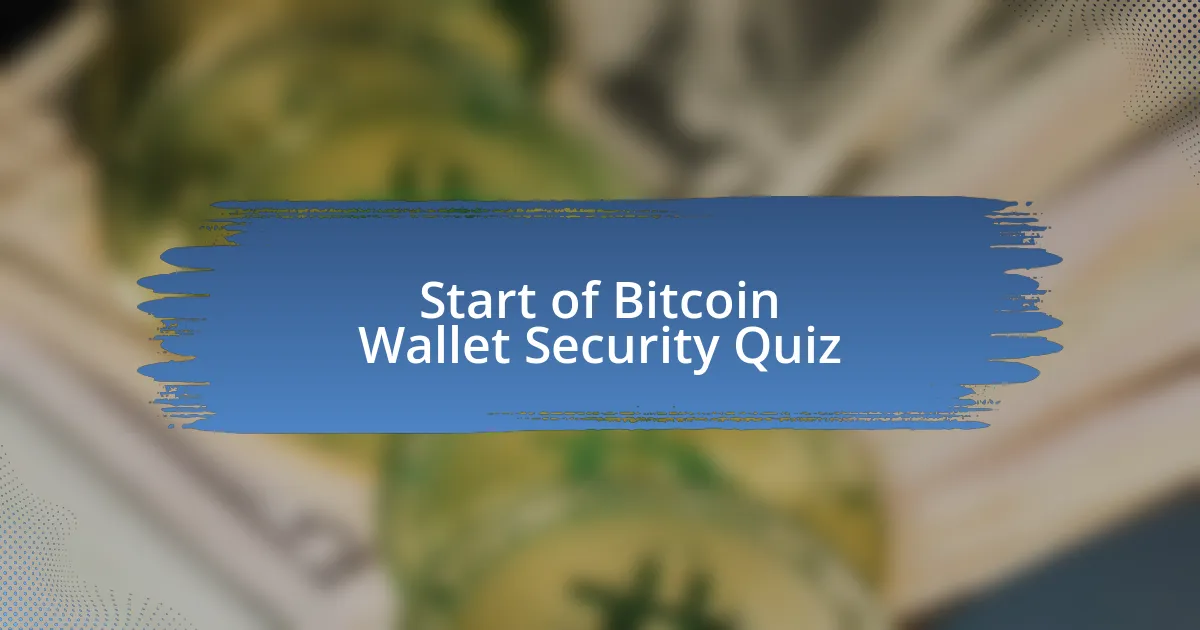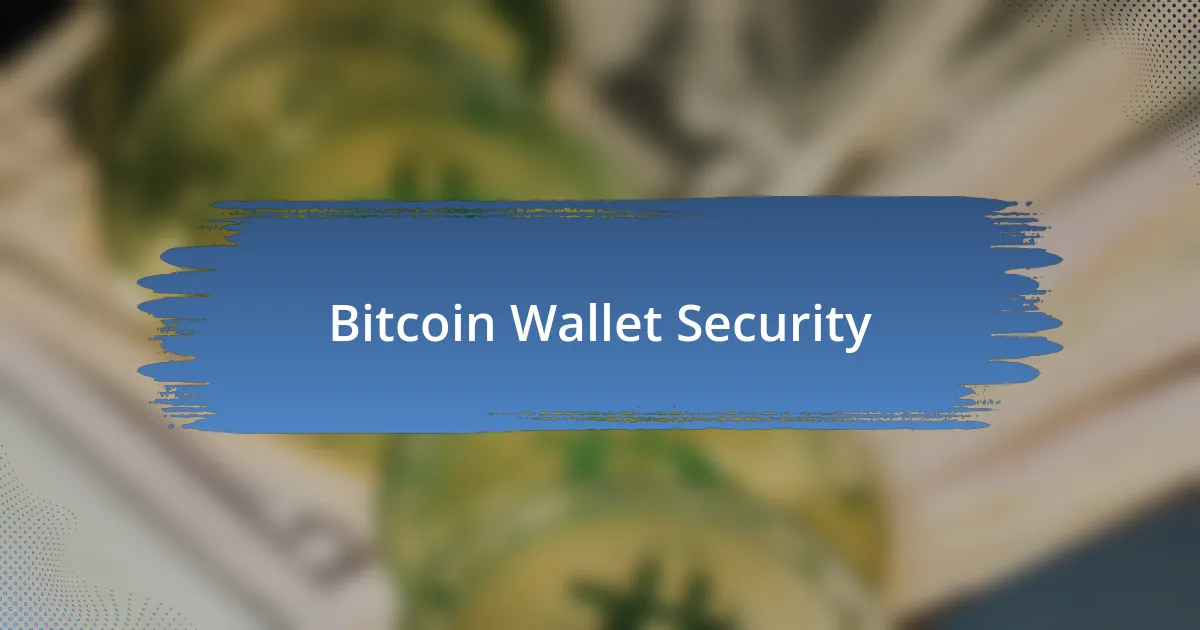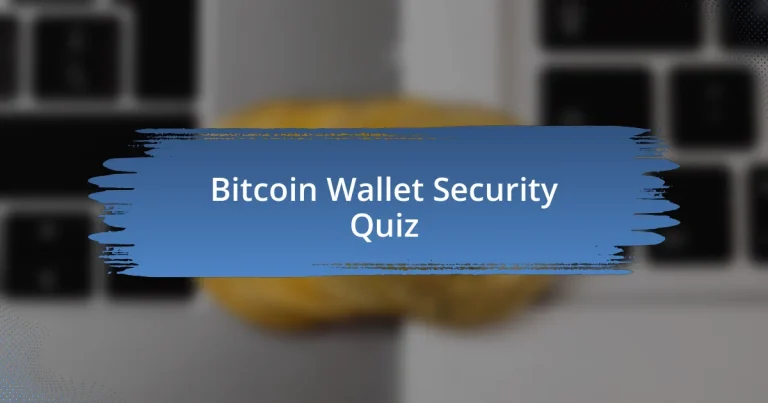
Start of Bitcoin Wallet Security Quiz
1. What is the definition of a Bitcoin wallet?
- A Bitcoin wallet is an online account where you can buy and sell Bitcoin easily.
- A Bitcoin wallet is a method of storing value, but it doesn`t store Bitcoin itself; it stores the keys required to send and receive Bitcoin over the blockchain.
- A Bitcoin wallet is a software that automatically mines Bitcoin for you when connected to the internet.
- A Bitcoin wallet is a physical device that holds Bitcoin coins securely in your home.
2. Why are seed words crucial for wallet security?
- They improve transaction speeds on the blockchain.
- They enable the creation of custom cryptocurrencies.
- They are used to secure internet connections.
- They allow recovery of your wallet if lost.
3. What function does a passphrase serve in a Bitcoin wallet?
- A passphrase tracks Bitcoin market prices.
- A passphrase is used to exchange Bitcoin for cash.
- A passphrase generates new Bitcoin automatically.
- A passphrase adds security to your Bitcoin wallet backup.
4. How is a private key related to a Bitcoin wallet?
- A private key allows access to the Bitcoin wallet and is essential for authorizing transactions.
- A private key is a public identifier used to receive Bitcoin from others.
- A private key functions as a password recovery option for the wallet`s email address.
- A private key is the Bitcoin wallet’s username to log in to an exchange.
5. What is the purpose of a Bitcoin address?
- An address is a government-issued identification needed for crypto transactions.
- An address is a string of numbers and letters that is unique to your wallet.
- An address is a physical location where Bitcoin is stored offline.
- An address is a type of hardware wallet used for storing cryptocurrencies.
6. What are the risks associated with mobile wallets?
- Mobile wallets are always completely secure by default.
- Using mobile wallets guarantees no risk of unauthorized access.
- Mobile wallets are immune to malware attacks.
- Losing or breaking your phone can lead to loss of access to your wallet.
7. How does a watch only wallet operate?
- A watch only wallet directly manages cryptocurrency transactions.
- A watch only wallet stores Bitcoin files for spending.
- A watch only wallet encrypts messages for secure communications.
- A watch only wallet allows tracking wallet balance without spending.
8. What distinguishes a custodial wallet from other types?
- A custodial wallet allows unlimited transactions without fees.
- A custodial wallet stores all your Bitcoin off-chain.
- A custodial wallet is managed by a third party.
- A custodial wallet is only available on desktop computers.
9. Why should you prefer a non-custodial wallet?
- You can access your Bitcoin using any computer.
- You have complete control over your private keys.
- It automatically exchanges Bitcoin for cash.
- It requires a monthly subscription fee.
10. How can transaction fees vary for sending Bitcoin?
- The transaction fee only varies depending on the type of wallet being used.
- The transaction fee can vary based on network congestion and the speed you want your transaction to confirm.
- The transaction fee is always a fixed amount regardless of the transaction size.
- The transaction fee is determined solely by the sender`s preferences and has nothing to do with network activity.
11. What is the primary function of a hardware wallet?
- Store cryptocurrency directly
- Enable transaction fees
- Securely store private keys
- Create passwords for accounts
12. What methods can be employed to safeguard private keys?
- Store backup on paper
- Use a hardware wallet
- Keep passwords in plain text
- Share private keys with friends
13. What threats might compromise private key security?
- Forgotten passwords
- Physical theft or loss of crypto wallet devices
- Sending Bitcoin to the wrong address
- Hacking an email account
14. What strategies can help mitigate man-in-the-middle attacks?
- Using TLS/SSL encryption
- Disabling encryption
- Increasing password strength
- Storing keys in plain text
15. Why are seed phrases essential for wallet recovery?
- Seed phrases restore access to your wallet.
- Seed phrases increase transaction speeds.
- Seed phrases prevent blockchain forks.
- Seed phrases are used for sending coins.
16. How do you secure your seed phrase effectively?
- Store it in a secure location using strong passwords.
- Write it on a piece of paper and leave it out.
- Save it as a text file on your computer.
- Share it with friends for safekeeping.
17. What advantages does biometric security offer for wallets?
- Biometric security replaces the need for passwords or PIN numbers entirely.
- Biometric security stores all your cryptocurrency within your wallet securely.
- Biometric security increases transaction speeds, allowing for faster payments.
- Biometric security prevents unauthorized access and adds a layer of protection for wallets.
18. Why should you use a VPN when accessing cryptocurrency wallets?
- To automatically back up cryptocurrency wallets.
- To secure communications and prevent data interception.
- To increase transaction speeds on the blockchain.
- To speed up internet connection while trading.
19. What is a hardware security module`s (HSM) function?
- A hardware security module (HSM) is designed to only store passwords securely.
- A hardware security module (HSM) is primarily used for backing up data in cloud storage.
- A hardware security module (HSM) is used to protect keys even if the device is stolen.
- A hardware security module (HSM) is a device used to boost system performance by increasing processing speed.
20. How can remote wipe capabilities protect your wallet?
- Keep your wallet encrypted to safeguard against network breaches that may target your assets.
- Use a strong password to secure your wallet account from unauthorized access in case of device loss.
- Install antivirus software to protect your wallet from malware threats that could compromise your funds.
- Enable remote wipe capabilities to erase wallet data if a device is lost or stolen, thereby preventing unauthorized access to your Bitcoin.
21. Why is it important to create multiple backups for your wallet?
- Using multiple backups stored in different secure locations ensures that even if one backup is compromised, you can still restore access to your Bitcoin wallet.
- Backups are unimportant as wallets automatically save your information online.
- You only need to backup your wallet if you change devices.
- Creating a single backup is sufficient if you write it down correctly.
22. How is double spending prevented in Bitcoin transactions?
- Transactions are encrypted to prevent double spending.
- The consensus mechanism validates transactions to prevent double spending.
- Double spending is prevented by using unique addresses for each transaction.
- Users manually check transactions to avoid double spending.
23. What role does gas play in Ethereum transactions?
- Gas is a fee paid to the Ethereum Foundation for using the network.
- Gas is a type of cryptocurrency used to pay for transactions.
- Gas is a unit of measurement for computational work on the Ethereum blockchain.
- Gas refers to the speed at which transactions are processed on the network.
24. How does a Merkle tree function in blockchain technology?
- A Merkle tree is a data structure that efficiently verifies data integrity through hashing.
- A Merkle tree is used to store user profiles and credentials securely.
- A Merkle tree generates public keys for cryptocurrency transactions.
- A Merkle tree is a type of smart contract that automates transactions.
25. What risks are associated with a 51% attack?
- Manipulation of transactions
- Complete shutdown of the network
- Increased transaction fees
- Loss of wallet keys
26. What defines a private blockchain?
- A private blockchain is a blockchain accessible to anyone without restrictions.
- A private blockchain is a type of blockchain that uses only public records.
- A private blockchain is a blockchain network where participation is restricted to authorized entities.
- A private blockchain is an open-source system that allows full public participation.
27. What measures can protect a wallet from physical threats?
- Use a hardware wallet
- Hide it under a mattress
- Keep it in a safe deposit box
- Store it in a drawer
28. Why is immutability a critical feature of blockchain technology?
- Immutability makes transactions easier to reverse.
- Immutability allows quick changes to transaction records.
- Immutability ensures transactions cannot be altered or deleted.
- Immutability reduces the overall size of the blockchain.
29. What constitutes double spending in the cryptocurrency context?
- Double spending is when users pay multiple fees for a single cryptocurrency transaction.
- Double spending refers to the act of consolidating multiple cryptocurrency wallets into one.
- Double spending is the act of using the same cryptocurrency tokens for multiple transactions, which is prevented by the consensus mechanism in blockchain.
- Double spending is when a user loses access to their wallet until they recover it.
30. What actions can you take to enhance network security for your wallet?
- Share private keys with friends
- Use a VPN for added security
- Store seed phrases in plain text
- Disable two-factor authentication

Quiz Successfully Completed!
Congratulations on finishing the quiz on Bitcoin Wallet Security! We hope you found it informative and engaging. Exploring the various facets of wallet security can feel daunting, but it’s crucial for protecting your digital assets. This quiz likely helped clarify common security practices, such as using two-factor authentication and recognizing phishing attempts.
Along the way, you may have discovered insight into how different wallet types, like hot and cold wallets, function. Understanding these concepts empowers you to make informed decisions about which wallet best suits your needs. Moreover, knowing how to secure your wallet can significantly mitigate risks associated with hacking or theft.
Are you ready to deepen your understanding? We invite you to check out the next section on this page about Bitcoin Wallet Security. Here, you’ll find more detailed information, best practices, and tips to further enhance your security measures. Learning is a continuous journey, and we’re excited to accompany you on this path!

Bitcoin Wallet Security
Understanding Bitcoin Wallets
A Bitcoin wallet is a digital tool that allows users to store, send, and receive Bitcoin. Wallets store the cryptographic keys needed to access and manage Bitcoin addresses. They come in various forms, including hardware, software, or paper wallets. Each type offers different levels of convenience and security. Hardware wallets, for example, keep keys offline, providing robust protection against online threats. In contrast, software wallets, while more accessible, are more susceptible to malware attacks.
The Importance of Wallet Security
Security is critical in the realm of Bitcoin. Compromised wallets can result in the loss of funds, which is irreversible. A strong security framework minimizes risks associated with hacking, phishing, and other cyber threats. Employing best practices in wallet security ensures that users can confidently manage their assets. The financial integrity of a user’s Bitcoin holdings largely depends on the protective measures they implement.
Common Security Measures for Bitcoin Wallets
Several security measures can enhance the protection of Bitcoin wallets. Two-factor authentication (2FA) adds an extra layer of security by requiring a second form of identification beyond just a password. Strong, unique passwords are essential to prevent unauthorized access. Additionally, users should regularly update their wallet software to patch vulnerabilities. Backup and recovery options also play a pivotal role in safeguarding funds against loss.
The Role of Private Keys in Wallet Security
Private keys are fundamental to Bitcoin wallet security. They are cryptographic keys that enable users to access and control their Bitcoin holdings. Keeping private keys secure is paramount; if anyone gains access, they can transfer funds without consent. Users must avoid sharing private keys and should store them offline or within encrypted environments. The security of the wallet is only as strong as the protection of its private keys.
Choosing the Right Type of Bitcoin Wallet
Selecting the appropriate type of Bitcoin wallet is crucial for effective security. Hardware wallets are considered the safest for long-term storage, as they are less vulnerable to online attacks. Software wallets offer convenience for frequent transactions but require diligent security practices. Evaluate factors like frequency of use, amount of Bitcoin held, and overall risk tolerance when choosing. This choice directly impacts the security of your Bitcoin assets.
What is Bitcoin wallet security?
Bitcoin wallet security refers to the measures taken to protect a Bitcoin wallet from unauthorized access and theft. This includes strategies like using strong passwords, enabling two-factor authentication, and keeping the wallet’s private keys confidential. According to a study by Chainalysis, over $4 billion worth of Bitcoin was stolen in various hacks, highlighting the importance of robust security practices.
How can I secure my Bitcoin wallet?
You can secure your Bitcoin wallet by using hardware wallets, enabling two-factor authentication, and regularly updating your software. Furthermore, backing up your wallet securely, using strong, unique passwords, and avoiding public Wi-Fi for transactions significantly reduce risks. The National Institute of Standards and Technology (NIST) recommends multi-factor authentication for sensitive accounts, which is applicable here.
Where should I store my Bitcoin wallet information?
You should store your Bitcoin wallet information in a secure, offline location such as a hardware wallet or a secure physical backup. Avoid storing sensitive information on cloud storage or devices that are connected to the internet to mitigate risks of hacking. Research shows that hardware wallets, such as Trezor or Ledger, are among the safest options for storing Bitcoin.
When should I change my Bitcoin wallet passwords?
You should change your Bitcoin wallet passwords immediately if you suspect any unauthorized access, following a data breach, or at regular intervals every few months. According to cybersecurity experts, changing passwords regularly can help minimize the risk of long-term exposure to theft.
Who is responsible for Bitcoin wallet security?
The individual user is primarily responsible for Bitcoin wallet security. Unlike traditional banking systems, Bitcoin does not offer the same safeguards. Users must take proactive measures, such as using best practices for security and understanding wallet features, to protect their assets. Statistics show that 98% of Bitcoin hacks occur due to user negligence rather than system flaws.


